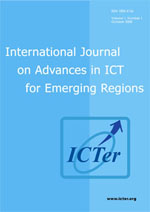Artificial Neural Network Ensembles in Time Series Forecasting: an Application of Rainfall Forecasting in Sri Lanka
Main Article Content
Abstract
Weather forecasting is a widely researched area in time series forecasting due to the necessity of accurate weather forecasts in various human activities. Out of numerous weather forecasting techniques Artificial Neural Networks (ANN) methodology is one of the most widely used techniques. In this study the application of Neural Network Ensembles in Short Term Rainfall Forecasting is investigated by using various types of Ensemble Neural Networks (ENN) to forecast the rainfall in Colombo, Sri Lanka. Ensembles are generated by changing the network architecture, changing initial weights of the ANN and changing the ANN type. Two ensembles one consisting of a collection of networks of various architectures of Multi Layer Feed Forward Network with Back Propagation Algorithm (BPN), and the other consisting of a combination of BPN, Radial Basis Function Network (RBFN) and General Regression Neural Network (GRNN). The performances of ensembles are compared with the performance of BPN, RBFN and GRNN. The ANNs are trained, validated and tested using daily observed weather data for 41 years. The results of our experiment show that other than random very high rainfall the ensemble models are able to predict rainfall (RMSE 8.06) more accurately than single ANN models (RMSE 8.22 for GRNN). Also changing the network type (RMSE 8.06) gives better results than changing the architecture (RMSE 8.21) of the ANN.
Article Details
Issue
Select the Journal Issue
Articles
